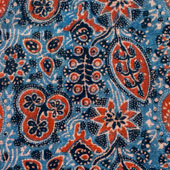Design Resource
Ajrakh Printing
Traditional Craft of Block Printing and Dyeing
by
Ajrakh is a traditional vegetable dyeing and resist block-printing technique on cloth. It is estimated to be around 4,500 years old. Sindh region (now in Pakistan) is said to be the birthplace of Ajrakh. The Ajrakh artisans in India are originally from Sindh and they migrated to Kutch in Gujarat and Barmer in Rajasthan. Ajrakh is the traditional attire of the Maldhari pastoral community of Bhuj. The men wear it as a lungi (wrapped lower garment), as a turban, or put it on their shoulders.
Artifacts related to Ajrakh have been found in the excavated remains from the Indus valley civilizations- Harappa and Mohenjo-Daro. Cloth artifacts with similar dyeing techniques have also been found in the Al-Fostat excavations in the Nile delta near Cairo, Egypt.





